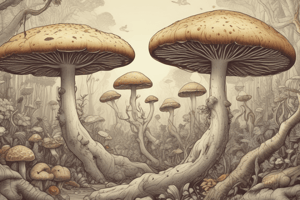Podcast
Questions and Answers
Fungi are essential components of an ______ and widely distributed in.
Fungi are essential components of an ______ and widely distributed in.
ecosystem
Fungi break down nonliving organic materials in order to return their essential elements to the ______.
Fungi break down nonliving organic materials in order to return their essential elements to the ______.
food chain
Most fungi do not attack living tissues or cause ______.
Most fungi do not attack living tissues or cause ______.
disease
Fungal pores may be easily dispersed into ______.
Fungal pores may be easily dispersed into ______.
Mold is a common term for certain ______ fungi.
Mold is a common term for certain ______ fungi.
Fungi are large group of _______ organisms.
Fungi are large group of _______ organisms.
Fungi break down nonliving organic materials in order to return their essential elements to the ______ chain.
Fungi break down nonliving organic materials in order to return their essential elements to the ______ chain.
Although a few of the many species of fungi are human _______, most fungi do not attack living tissues.
Although a few of the many species of fungi are human _______, most fungi do not attack living tissues.
Mold is fast growing and capable of producing hundreds of thousands of ______ in a short period of time.
Mold is fast growing and capable of producing hundreds of thousands of ______ in a short period of time.
Mold is a common term for certain ______ fungi that are filamentous.
Mold is a common term for certain ______ fungi that are filamentous.
Flashcards are hidden until you start studying
Study Notes
Fungi in Ecosystems
- Fungi are essential components of ecosystems and are widely distributed.
- They are a large group of eukaryotic organisms that break down nonliving organic materials.
Role of Fungi in Nature
- Fungi play a crucial role in nature by returning essential elements to the food chain through decomposition.
Characteristics of Fungi
- Most fungi are saprophytic, meaning they do not attack living tissues or cause disease.
- Some species of fungi are human pathogens, but they are a minority.
Fungal Spores
- Fungal spores can be easily dispersed into indoor environments.
- Mold, a type of filamentous fungi, is capable of producing hundreds of thousands of spores in a short period of time.
- Mold is a fast-growing fungus.
Fungi in Ecosystems
- Fungi are essential components of ecosystems and are widely distributed.
- They are a large group of eukaryotic organisms that break down nonliving organic materials.
Role of Fungi in Nature
- Fungi play a crucial role in nature by returning essential elements to the food chain through decomposition.
Characteristics of Fungi
- Most fungi are saprophytic, meaning they do not attack living tissues or cause disease.
- Some species of fungi are human pathogens, but they are a minority.
Fungal Spores
- Fungal spores can be easily dispersed into indoor environments.
- Mold, a type of filamentous fungi, is capable of producing hundreds of thousands of spores in a short period of time.
- Mold is a fast-growing fungus.
Studying That Suits You
Use AI to generate personalized quizzes and flashcards to suit your learning preferences.




